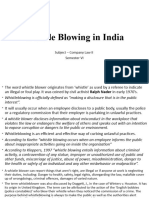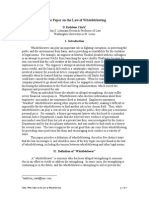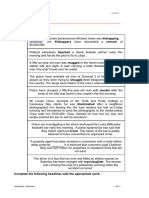Organisational Whistle Blowers
Organisational Whistle Blowers
Uploaded by
kiran9127Copyright:
Available Formats
Organisational Whistle Blowers
Organisational Whistle Blowers
Uploaded by
kiran9127Original Description:
Copyright
Available Formats
Share this document
Did you find this document useful?
Is this content inappropriate?
Copyright:
Available Formats
Organisational Whistle Blowers
Organisational Whistle Blowers
Uploaded by
kiran9127Copyright:
Available Formats
Organisational whistle blowers
A whistleblower (whistle-blower or whistle blower)[1] is a person who tells the public or someone in authority about alleged dishonest or illegal activities (misconduct) occurring in a government department, a public or private organization, or a company. One of the first laws that protected whistleblowers was the 1863 United States False Claims Act (revised in 1986), which tried to combat fraud by suppliers of the United States government during the Civil War. The act encourages whistleblowers by promising them a percentage of the money recovered or damages won by the government and protects them from wrongful dismissal.
What is a whistleblower protection law? A whistleblower is defined as someone who exposes wrongdoing, fraud, corruption or mismanagement. In many cases, this could be a person who works for the government who would report misconduct within the government or it could be an employee of a private company who reports corrupt practices within the company. The law that a government enacts to protect such persons who help expose corruption is called a whistleblower protection law. The Whistleblower Protection Act of 1989 is a United States federal law that protects federal whistleblowers who work for the government and report agency misconduct. A federal agency violates the Whistleblower Protection Act if agency authorities take (or threaten to take) retaliatory personnel action against any employee or applicant because of disclosure of information by that employee or applicant. Whistleblowers may file complaints that they believe reasonably evidences a violation of a law, rule or regulation; gross mismanagement; gross waste of funds; an abuse of authority; or a substantial and specific danger to public health or safety.
Whistleblower Protection Act of 1989
Does India have a whistleblower protection law?
No, at present India does not have any law to protect whistleblowers, though a bill for the purpose is in the pipeline. The issue of protection for whistleblowers caught the attention of the entire nation when National Highways Authority of India (NHAI) engineer Satyendra Dubey was killed after he wrote a letter to the office of then PM A B Vajpayee detailing corruption in the construction of highways. In the letter, he had asked specifically that his identity be kept secret. Instead, the letter was forwarded to various concerned departments without masking Dubey's identity.
Dubey's murder led to a public outcry at the failure to protect him. As a result, in April 2004, the Supreme Court pressed the government into issuing an office order, the Public Interest Disclosures and Protection of Informers Resolution, 2004 designating CVC as the nodal agency to handle complaints on corruption. However, over a year later, Manjunath Shanmugham, an IIM graduate and a sales manager of the IOC, was murdered on Nov 19, 2005 for exposing the racket of adulteration of petrol and the mafia behind it. This brought renewed focus on need for a law to protect whistleblowers but five years after the last episode, there is still no law in India.
Origin of term
The term whistleblower comes from the phrase "blow the whistle," which refers to a whistle being blown by a police officer or a referee to indicate an activity that is illegal or a foul.[3][4]
[edit] Definition
Most whistleblowers are internal whistleblowers, who report misconduct on a fellow employee or superior within their company. External whistleblowers, however, report misconduct on outside persons or entities. In these cases, depending on the information's severity and nature, whistleblowers may report the misconduct to lawyers, the media, law enforcement or watchdog agencies, or other local, state, or federal agencies. In some cases, external whistleblowing is encouraged by offering monetary reward.
You might also like
- Analysis On The Act of BriberyDocument18 pagesAnalysis On The Act of BriberyMohd Najib Zainal100% (3)
- Leon County Sheriff'S Office Daily Booking Report 5-Oct-2021 Page 1 of 3Document3 pagesLeon County Sheriff'S Office Daily Booking Report 5-Oct-2021 Page 1 of 3WCTV Digital TeamNo ratings yet
- 15 Eng1d Ss Lamb To The Slaughter QuestionsDocument3 pages15 Eng1d Ss Lamb To The Slaughter Questionsapi-372183039No ratings yet
- Life Skills Assignment 3Document15 pagesLife Skills Assignment 3Danish SeelochunNo ratings yet
- Richard AngeloDocument8 pagesRichard AngeloCasey BergerNo ratings yet
- Police CodesDocument10 pagesPolice Codesjair100% (1)
- WhistleblowerDocument13 pagesWhistleblowerjaishree100% (1)
- Whistleblowing and The Protection of Whistleblowers ActDocument12 pagesWhistleblowing and The Protection of Whistleblowers ActAadhithya KPNo ratings yet
- Will Truth Prevail?: in Its Current Form, The Whistle-Blowers' Bill Will Simply Not DoDocument1 pageWill Truth Prevail?: in Its Current Form, The Whistle-Blowers' Bill Will Simply Not DoAravindVRNo ratings yet
- Whistle BlowingDocument15 pagesWhistle BlowingMudit GuptaNo ratings yet
- Whistle BlowerDocument7 pagesWhistle BlowerCharu VinayakNo ratings yet
- What Is The Whistleblowers Protection BillDocument18 pagesWhat Is The Whistleblowers Protection Billbernadette concillesNo ratings yet
- WhistleblowersDocument18 pagesWhistleblowersPrathyush KNo ratings yet
- Law Commission 179th ReportDocument114 pagesLaw Commission 179th ReportlachippaNo ratings yet
- AC Toolkit Chap1Document65 pagesAC Toolkit Chap1ellizabethhuniNo ratings yet
- Whistle BlowingDocument14 pagesWhistle BlowingNishant JainNo ratings yet
- Chapter 1 NewDocument36 pagesChapter 1 NewbandlagudaauroraNo ratings yet
- Whistle Blowing PolicyDocument3 pagesWhistle Blowing Policyemail2srcNo ratings yet
- SYNOPSIS DissertationDocument4 pagesSYNOPSIS DissertationVlogster zzNo ratings yet
- White Paper On The Law of WhistleblowingDocument5 pagesWhite Paper On The Law of WhistleblowingKathleenClarkNo ratings yet
- April4.2012 - B House Passes Whistleblower Protection, Security and Benefit Act of 2011Document2 pagesApril4.2012 - B House Passes Whistleblower Protection, Security and Benefit Act of 2011pribhor2No ratings yet
- Whistleblower Protection ActDocument5 pagesWhistleblower Protection ActLekha chakravortyNo ratings yet
- Whistleblowing Group AssgDocument3 pagesWhistleblowing Group AssgEmellda MANo ratings yet
- Presentation LST BallbDocument13 pagesPresentation LST Ballbgurkaranchahal1234No ratings yet
- Assingment 2 NDocument2 pagesAssingment 2 NAfreen SarwarNo ratings yet
- A Brief Review About Whistleblower Between Us and IndiaDocument8 pagesA Brief Review About Whistleblower Between Us and IndiaMazumdar TouhidNo ratings yet
- Protection For Whistle BlowersDocument12 pagesProtection For Whistle BlowersFazil AhamedNo ratings yet
- A Case of WhistleblowingDocument5 pagesA Case of WhistleblowingrafiNo ratings yet
- Compiled Notes - Corruption LawDocument32 pagesCompiled Notes - Corruption LawChetanya KapoorNo ratings yet
- Corruption in India EssayDocument10 pagesCorruption in India EssayAbhimanyu SinghNo ratings yet
- WHISTLEDocument7 pagesWHISTLEsophia maguiruiNo ratings yet
- Copy The ArticleDocument4 pagesCopy The ArticleLITTLE INFINITENo ratings yet
- WhistleblowerDocument14 pagesWhistleblowerAvinash Kumar100% (2)
- Project ReportDocument49 pagesProject ReportShivani Bansal50% (4)
- Whistle Blowing Case in InfosysDocument7 pagesWhistle Blowing Case in InfosysMahendhar Reddy PagadalaNo ratings yet
- Ol Mys 03.04.18Document10 pagesOl Mys 03.04.18umarNo ratings yet
- Graft and CorruptionDocument9 pagesGraft and CorruptionMel Jazer CAPENo ratings yet
- Whistleblower: Registration For Wikiconference India 2011, Mumbai Is Now OpenDocument15 pagesWhistleblower: Registration For Wikiconference India 2011, Mumbai Is Now Openkiran9127No ratings yet
- TermPaper - Whistle BlowingDocument6 pagesTermPaper - Whistle BlowingAnshul GoyalNo ratings yet
- The Right To InformationDocument7 pagesThe Right To InformationMd. Akmal HossainNo ratings yet
- Discussion Note - Whistle Blower ProtectionDocument4 pagesDiscussion Note - Whistle Blower ProtectionNetwork18No ratings yet
- Session 3 - RTIDocument9 pagesSession 3 - RTI589 TYBMS Shivam JoshiNo ratings yet
- Media (Journalists)Document9 pagesMedia (Journalists)Khrean Kae SantiagoNo ratings yet
- AstrologyDocument31 pagesAstrologyChar LeyNo ratings yet
- Must Read, Understand, Analyze, Evaluate, Then ReactDocument3 pagesMust Read, Understand, Analyze, Evaluate, Then ReactBonjovi HajanNo ratings yet
- Whistle BlowersDocument16 pagesWhistle BlowersNikhil YadavNo ratings yet
- Freedom of Information FactsheetDocument4 pagesFreedom of Information FactsheetCat CambridgeNo ratings yet
- Right To Information: Why in News?Document5 pagesRight To Information: Why in News?Deepeksh GaurNo ratings yet
- Law Commission of India: One Hundred and Seventy Ninth ReportDocument114 pagesLaw Commission of India: One Hundred and Seventy Ninth ReportVed VyasNo ratings yet
- Americas Constitution and The Bill of Rights - EditedDocument2 pagesAmericas Constitution and The Bill of Rights - EditedmrgkibetNo ratings yet
- Whistle Blowing PDFDocument21 pagesWhistle Blowing PDFAbdul MuqeetNo ratings yet
- Right To InformationDocument5 pagesRight To InformationHello HiiNo ratings yet
- Nkumba UniversityDocument13 pagesNkumba UniversityAlex OkiriaNo ratings yet
- Whistleblowing in India, US and UK Corporate Laws: A Comparative StudyDocument10 pagesWhistleblowing in India, US and UK Corporate Laws: A Comparative StudysriprasadNo ratings yet
- Impact of Rti Act On CorruptionDocument17 pagesImpact of Rti Act On CorruptionashutoshNo ratings yet
- Presentation On LEGAL Aspects of Business: CommunicationDocument24 pagesPresentation On LEGAL Aspects of Business: CommunicationAman BaghelNo ratings yet
- Whistleblowing: Meaning of Whistle BlowingDocument9 pagesWhistleblowing: Meaning of Whistle BlowingSujay Das SonuNo ratings yet
- DefamationDocument3 pagesDefamationAadarsh JoshiNo ratings yet
- Atty. Loanzon - Consti Law II January 2017 OrigDocument20 pagesAtty. Loanzon - Consti Law II January 2017 OrigApple AbadillaNo ratings yet
- Ople v. Torres (Privacy Rights)Document49 pagesOple v. Torres (Privacy Rights)Nor Fatmah SBaltNo ratings yet
- WhiteDocument5 pagesWhitelovesuvikashNo ratings yet
- IJRHS 2014 Vol02 Issue-5Document5 pagesIJRHS 2014 Vol02 Issue-5lovesuvikashNo ratings yet
- ActsDocument25 pagesActsLaksha ChibberNo ratings yet
- Uncovering the Dirty Truth: The Devastating Impact of Corruption on American Politics"From EverandUncovering the Dirty Truth: The Devastating Impact of Corruption on American Politics"No ratings yet
- Characteristics of The CBDDocument2 pagesCharacteristics of The CBDkiran9127No ratings yet
- PAN AO Code Master Version 6.0 Other Than MumbaiDocument519 pagesPAN AO Code Master Version 6.0 Other Than MumbaiSwarup Mukherjee0% (1)
- MBA (FB&E) 13-15 Elective Course Reg. Details For Student After Change of EML & INRADocument12 pagesMBA (FB&E) 13-15 Elective Course Reg. Details For Student After Change of EML & INRAkiran9127No ratings yet
- Introduction To HULDocument5 pagesIntroduction To HULkiran9127No ratings yet
- SareesDocument4 pagesSareeskiran9127No ratings yet
- What All Brands of Kurtis and Salwar Suits Are You Aware Of?Document20 pagesWhat All Brands of Kurtis and Salwar Suits Are You Aware Of?kiran9127No ratings yet
- SareesDocument4 pagesSareeskiran9127No ratings yet
- Mumbai Crime Journalist Jyotirmoy Dey Shot DeadDocument3 pagesMumbai Crime Journalist Jyotirmoy Dey Shot Deadkiran9127No ratings yet
- CSR ContentDocument9 pagesCSR Contentkiran9127No ratings yet
- Reshma RangrezDocument1 pageReshma Rangrezkiran9127No ratings yet
- Whistleblower: Registration For Wikiconference India 2011, Mumbai Is Now OpenDocument15 pagesWhistleblower: Registration For Wikiconference India 2011, Mumbai Is Now Openkiran9127No ratings yet
- Our Lives Begin To End The Day We Become Silent About Things That Matter." - Martin Luther King, JRDocument12 pagesOur Lives Begin To End The Day We Become Silent About Things That Matter." - Martin Luther King, JRkiran9127No ratings yet
- BRCM College of Business Administration: Library Assignment-2013-14Document5 pagesBRCM College of Business Administration: Library Assignment-2013-14kiran9127No ratings yet
- Vocabulary - ExercisesDocument4 pagesVocabulary - Exercisescarlasorogarcia46No ratings yet
- PosterDocument3 pagesPosterputri aleesyaNo ratings yet
- Rape in CustodyDocument16 pagesRape in CustodyKripa KafleyNo ratings yet
- G.R. No. 218209 - Lechoncito, Trexia Mae DDocument3 pagesG.R. No. 218209 - Lechoncito, Trexia Mae DTrexiaLechoncitoNo ratings yet
- Police Blotter ReportDocument1 pagePolice Blotter ReportTomas Flores67% (3)
- Peoria County Inmates 04/12/13Document9 pagesPeoria County Inmates 04/12/13Journal Star police documentsNo ratings yet
- The Vocabulary of Crime and LawDocument3 pagesThe Vocabulary of Crime and LawFloare EmilNo ratings yet
- York County Court Schedule For Oct. 25Document25 pagesYork County Court Schedule For Oct. 25York Daily Record/Sunday NewsNo ratings yet
- 19 Offences Against Property-IDocument26 pages19 Offences Against Property-Isrisunandha04No ratings yet
- Literature Review On Child LabourDocument3 pagesLiterature Review On Child Labourabdul khalala ibrahim dumbuyaNo ratings yet
- Topic-14Document6 pagesTopic-14MANUEL VILLARBANo ratings yet
- Typology of Cyber CrimeDocument28 pagesTypology of Cyber CrimeJiē Xí Nobrab NozulNo ratings yet
- Leon County Sheriff'S Office Daily Booking Report 11-Oct-2021 Page 1 of 3Document3 pagesLeon County Sheriff'S Office Daily Booking Report 11-Oct-2021 Page 1 of 3WCTV Digital TeamNo ratings yet
- Digest - People v. PeraltaDocument2 pagesDigest - People v. PeraltaDae JosecoNo ratings yet
- Probable Cause Affidavit Lottie and O'NealDocument3 pagesProbable Cause Affidavit Lottie and O'NealEmily FilipskiNo ratings yet
- Criminal Law ChartsDocument18 pagesCriminal Law Chartsmfarooqi21No ratings yet
- York County Court Schedule For June 8, 2015Document15 pagesYork County Court Schedule For June 8, 2015rugbyprodigy824No ratings yet
- Peoria County Booking Sheet 11/14/15Document8 pagesPeoria County Booking Sheet 11/14/15Journal Star police documentsNo ratings yet
- Kiersten Tomasini PC StatementDocument2 pagesKiersten Tomasini PC StatementMcKenzie StaufferNo ratings yet
- STS Symp.Document32 pagesSTS Symp.Mizza Moreno CantilaNo ratings yet
- Gender Based Violence - Survivor, Victim, Perpetrator, and Human RightsDocument3 pagesGender Based Violence - Survivor, Victim, Perpetrator, and Human RightsgabriellejoshuaramosNo ratings yet
- Varlakshimi Dula Enni Sarlu Dengelao DinniDocument2 pagesVarlakshimi Dula Enni Sarlu Dengelao DinniRojaBoyina100% (1)
- People V TolingDocument1 pagePeople V TolingHannah Sy0% (1)
- Crime Gazette 2019Document176 pagesCrime Gazette 2019samarNo ratings yet
- Online Safety and SecurityDocument8 pagesOnline Safety and SecurityCia LabesigNo ratings yet
- Bullyin: Jorge Josue Placencia TriviñoDocument1 pageBullyin: Jorge Josue Placencia TriviñoJosueNo ratings yet




































































































